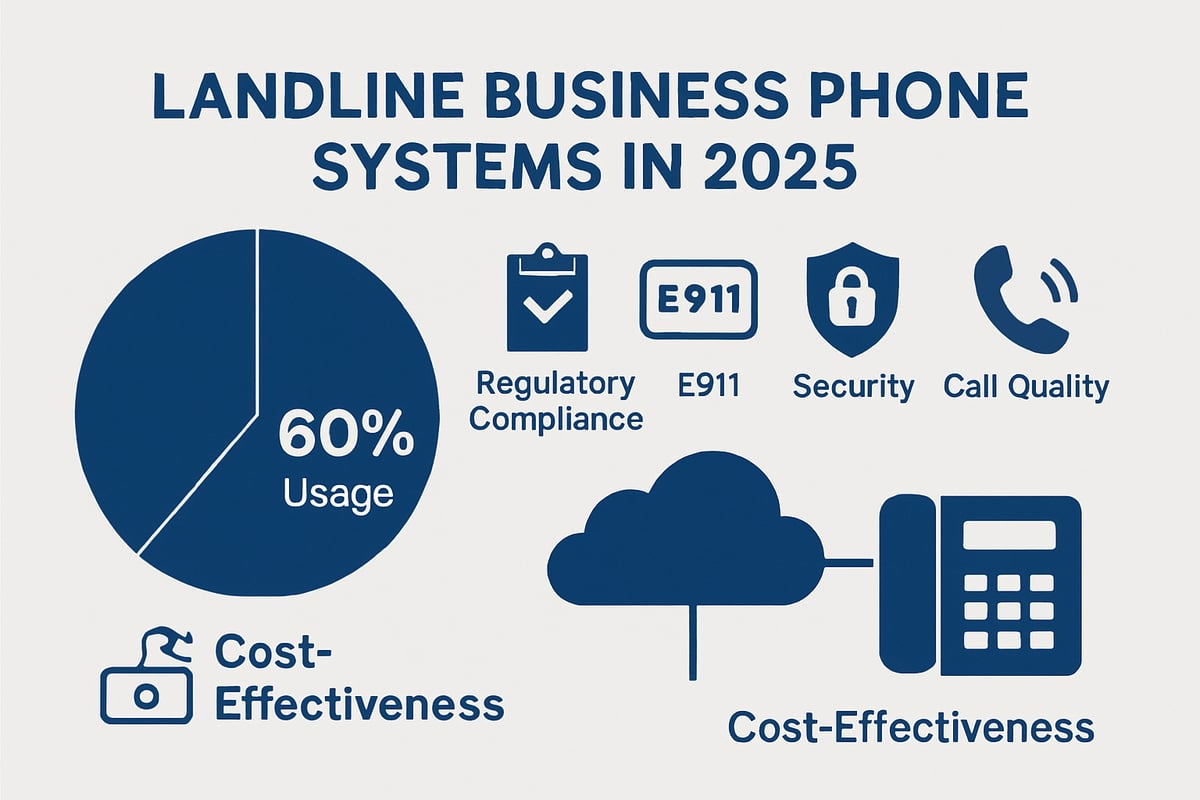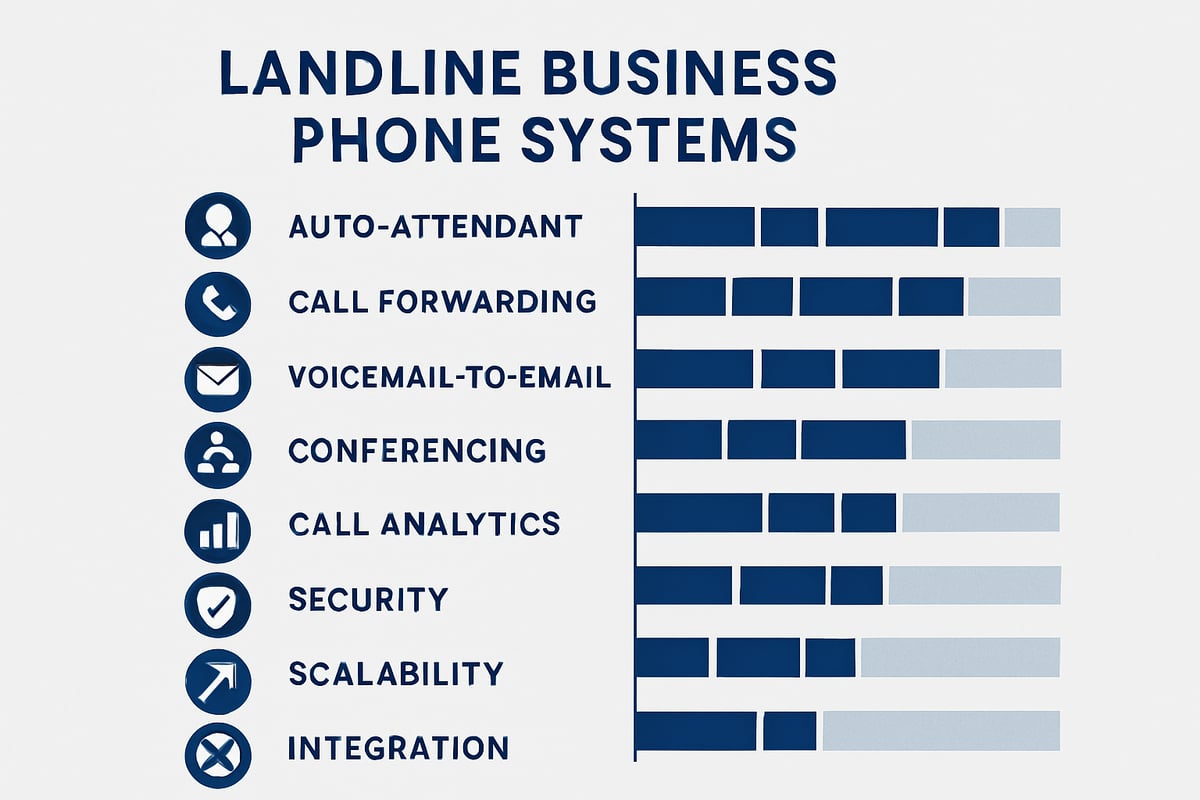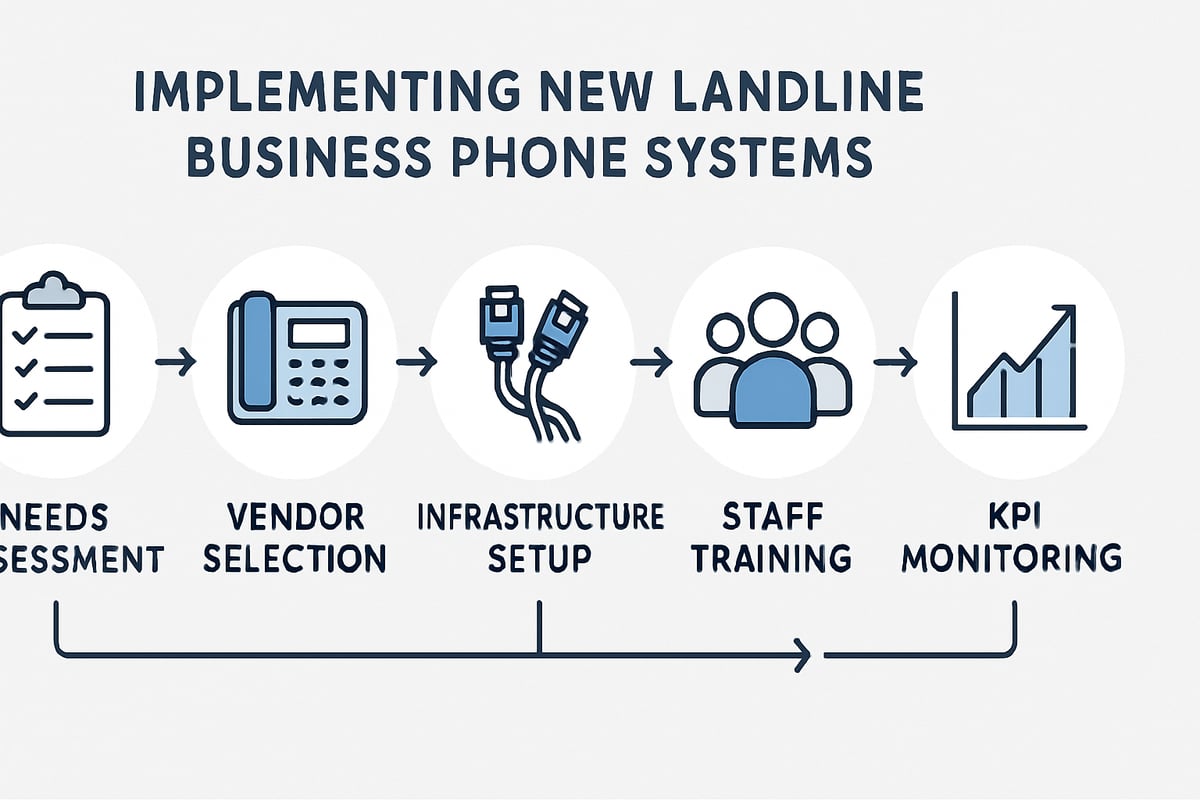7 Essential Landline Business Phone Systems for 2025
Discover the top 7 landline business phone systems for 2025 Compare features, pricing, and benefits to choose the right solution for reliable business communications
Redaction
25/09/2025, 12:30:00Landline business phone systems are experiencing a significant revival in 2025 as companies navigate rapid digital transformation. Despite the rise of mobile and cloud communication, many organizations still value the unmatched call quality, reliability, and compliance that landline solutions provide.
Businesses today face persistent challenges - dropped calls, inconsistent service, and strict regulatory requirements. Selecting the right landline system is crucial for seamless daily operations, strong customer service, and long-term growth.
In this article, we will explore the 7 best landline business phone systems for 2025, reviewing their features, pricing, and ideal use cases to help you make an informed decision.
Why Landline Business Phone Systems Remain Essential in 2025
Despite the rapid adoption of mobile and VoIP technologies, landline business phone systems remain a cornerstone of effective business communication in 2025. Many organizations, especially those with mission-critical operations, still depend on these systems to ensure stability and compliance.
Regulatory and Industry Requirements
Certain industries, such as legal and healthcare, face strict mandates for secure, reliable communications. Landline business phone systems provide compliance with regulations like HIPAA and legal retention requirements, which often demand physical connectivity and auditable call records.
Emergency services access, including E911 compliance, is another crucial factor. Landline connections guarantee precise location tracking and uninterrupted service during power outages, which is essential for safety and regulatory adherence.
Advantages of Landline Business Phone Systems
Landline business phone systems offer several unmatched benefits for modern organizations:
- Superior Call Quality: Analog and digital lines deliver consistently clear audio, free from latency or packet loss.
- High Uptime: Dedicated infrastructure minimizes downtime, supporting business continuity.
- Security: Physical lines reduce exposure to cyber threats, with options for encryption and fraud detection.
- Emergency Reliability: Landlines function even during internet outages, ensuring critical calls always get through.
A recent TechRepublic survey found that 60% of small and medium businesses still use or plan to upgrade their landline business phone systems, reflecting the enduring value and trust in this technology.
Integration with Modern Technologies
Modern landline business phone systems are not isolated relics. Hybrid solutions blend traditional lines with VoIP and unified communications platforms, allowing seamless integration with CRM and ERP tools. This flexibility supports businesses as they scale, merge, or adapt to remote work.
A growing number of companies leverage hybrid systems to unify communications across locations, making it easier to manage high call volumes while retaining the reliability of physical lines.
Cost-Effectiveness and Real-World Success
For high-volume calling and multi-location enterprises, landline business phone systems can be more cost-effective than relying solely on mobile or cloud solutions. Bundled service packages and predictable billing make budgeting simpler.
Consider the example of a regional healthcare provider that avoided costly downtime by maintaining a robust landline infrastructure, ensuring uninterrupted patient communication during a network outage.
Addressing Misconceptions
The notion that landline business phone systems are obsolete is increasingly inaccurate. According to the Landline phones market report, demand remains strong as businesses recognize the strategic advantages of landlines alongside digital tools.
By combining traditional reliability with modern integration, landline business phone systems continue to provide a critical foundation for secure, scalable, and compliant business communications.

Key Features to Consider When Choosing a Landline Business Phone System
Selecting the right landline business phone systems is a strategic decision that can impact communication, productivity, and customer satisfaction. As you evaluate your options, focus on the features that will support your business both today and as you grow.

Must-Have Features for Modern Businesses
Modern landline business phone systems go beyond basic calling. Essential features include auto-attendant for routing calls efficiently, call forwarding to ensure no call is missed, and voicemail-to-email for streamlined message management. Conferencing functions enable team collaboration, while call analytics offer insights into call volume and performance.
These features help businesses maintain a high level of professionalism and responsiveness. By selecting a system with these capabilities, you ensure reliable communication with clients and partners.
Scalability and System Types
Scalability is crucial for landline business phone systems, especially as organizations expand. Look for multi-line support and solutions that make it easy to add handsets or extensions. This flexibility ensures your phone system grows with your team.
Consider whether an analog, digital, or hybrid landline system best fits your needs. Analog systems offer simplicity, digital options provide advanced features, and hybrid models combine the strengths of both, allowing for gradual upgrades.
Integration and Security Considerations
Seamless integration with CRM, ERP, and other business tools can elevate the value of landline business phone systems. Direct integration supports better data management and workflow automation, improving efficiency across departments.
Security is another vital aspect. Modern systems often include encryption, fraud detection, and user authentication to protect sensitive communications. These measures are especially important for industries handling confidential information or subject to regulatory compliance.
Support, Pricing, and Real-World Outcomes
Reliable support and transparent pricing are essential when investing in landline business phone systems. Evaluate vendors for their maintenance offerings, whether onsite or remote, and check for hidden costs in subscription or upfront pricing models. For a breakdown of available options, Landline phone system services can help you explore what to expect from different providers.
Businesses that choose robust systems with the right features often experience measurable results, such as improved customer satisfaction and reduced downtime.
Choosing landline business phone systems with the right mix of features, scalability, and support will position your company for long-term success. Prioritize solutions that align with your operational goals and can adapt as your business evolves.
7 Essential Landline Business Phone Systems for 2025
Selecting the best landline business phone systems in 2025 requires a careful look at market trends, technological advancements, and the evolving needs of companies. The selection below highlights a diverse mix of providers, each offering 2025-ready features, scalability, and reliability. As the business phone systems market analysis shows, demand for secure, integrated, and future-proof solutions is rising, making it essential to understand what sets each system apart.
AT&T SynJ Business Phone System
The AT&T SynJ is a standout among landline business phone systems, designed for small to medium-sized operations prioritizing reliability and scalability. Pricing typically starts around $350 for the base set, with additional handsets available for about $100 each.
Key features include:
- Expandable support for up to 10 handsets, ideal for growing teams.
- DECT 6.0 technology for interference-free, crystal-clear communication.
- Four separate landlines, ensuring seamless call handling.
The SynJ system’s robust wireless range and straightforward installation make it attractive for businesses that need dependable performance without complex setup. While it excels in ease of use, the system’s advanced integration capabilities are limited, making it best suited for organizations with basic needs.
Pros:
- User-friendly interface
- Strong support and warranty options
- Clear call quality
Cons:
- Limited third-party integrations
- No built-in advanced analytics
For businesses that value straightforward, scalable landline business phone systems, the AT&T SynJ is a reliable choice.
Panasonic KX-TA824 Advanced Hybrid System
The Panasonic KX-TA824 is a flexible hybrid solution, bridging analog and digital technologies. Pricing varies by configuration but generally starts near $400, with extension modules and handsets available as add-ons.

Notable features:
- Hybrid analog/digital design, supporting up to 24 extensions.
- Seamless migration path for businesses upgrading from legacy analog systems.
- Customizable call routing and flexible configuration.
This system shines for organizations transitioning to modern landline business phone systems without abandoning existing infrastructure. Its future-proof design enables gradual upgrades, allowing businesses to adapt at their own pace.
Pros:
- Versatile and customizable
- Strong legacy system compatibility
- Feature-rich for the price
Cons:
- Initial setup can be complex for non-technical users
- Requires ongoing maintenance
Companies seeking adaptable landline business phone systems that balance legacy support with new capabilities will find the KX-TA824 a fit.
Mitel MiVoice Office 250
Mitel’s MiVoice Office 250 is a robust solution for organizations needing advanced features and multi-site support. Pricing is tiered, typically starting at $800-$1,200 for the base system, with licensing fees for additional users.
Feature highlights:
- Multi-site support for distributed teams
- Built-in voicemail and mobility integration
- Flexible hybrid deployment (landline and VoIP)
This platform is designed for businesses with a focus on scalability and performance. It enables seamless communication across locations, making it a favored choice for call centers and enterprises with remote workers.
Pros:
- Comprehensive feature set
- Reliable uptime and call quality
- Excellent remote work support
Cons:
- Higher upfront investment
- May require technical expertise for configuration
For growing businesses that demand advanced landline business phone systems, the MiVoice Office 250 delivers both flexibility and reliability.
Nextiva Business Phone System
Nextiva offers a hybrid landline/VoIP platform that brings together traditional telephony and modern cloud-based features. Pricing begins at around $25 per user per month, with scalable contract options for expanding organizations.
Core features:
- Integrated auto-attendant and call analytics dashboard
- Cloud backup for business continuity
- Hybrid architecture supporting both landline and VoIP calls
Nextiva excels at unifying communications, making it easy for businesses to manage calls, messages, and meetings from one platform. Its flexibility and strong customer support make it well-suited for companies in growth mode.
Pros:
- Easy to scale as teams expand
- Unified communications tools
- Responsive, helpful support
Cons:
- Advanced features require some learning
- Higher recurring subscription costs for large teams
Businesses in need of flexible, modern landline business phone systems will appreciate Nextiva’s blend of tradition and innovation.
Cisco Business Phone Systems (7800 Series)
Cisco’s 7800 Series stands out among landline business phone systems for its enterprise-grade security and integration capabilities. Pricing is generally $150-$300 per handset, with additional costs for network integration and support services.
Key features:
- HD audio and secure calling protocols
- Power over Ethernet (PoE) support
- Multi-line capability and advanced network integration
Designed for medium to large enterprises, these systems provide robust call management and tight integration with Cisco’s broader networking solutions. The advanced setup can be complex, but the payoff is exceptional reliability and security.
Pros:
- Scalable for growing organizations
- Advanced security features
- Seamless integration with Cisco infrastructure
Cons:
- Requires technical expertise to deploy
- Higher total cost for large deployments
Security-conscious organizations looking for scalable, secure landline business phone systems will benefit from Cisco’s 7800 Series.
Avaya IP Office
Avaya IP Office is renowned for its modular design and hybrid capabilities, supporting both landline and VoIP communications. Pricing varies, with entry-level systems starting near $1,000, plus licensing and support plans.
Standout features:
- Hybrid landline/VoIP support
- Built-in conferencing and CRM integration
- Remote management tools for IT teams
Its modular approach allows businesses to customize the system to their needs, adding features or capacity as they grow. Avaya’s rich feature set is ideal for organizations seeking a future-ready solution with strong support.
Pros:
- Highly customizable and modular
- Broad range of integrated features
- Strong vendor support
Cons:
- Can be expensive for smaller companies
- Complexity may require IT oversight
For organizations that want adaptable, feature-rich landline business phone systems, Avaya IP Office is a leading contender.
VTech CM18445 Small Business System
The VTech CM18445 is a budget-friendly entry in the world of landline business phone systems, tailored for startups and small offices. Pricing starts at about $200 for a base package, making it accessible for businesses with limited budgets.
Key features:
- Four-line operation with digital answering system
- Built-in intercom and paging functions
- Simple installation and intuitive controls
This system is designed for ease of use, allowing new businesses to get up and running quickly. While its scalability is limited, it excels as a reliable, affordable solution for small teams.
Pros:
- Affordable upfront cost
- Intuitive, user-friendly interface
- Quick installation
Cons:
- Not ideal for larger organizations
- Fewer advanced features
Startups and small offices seeking cost-effective landline business phone systems will find the VTech CM18445 a solid, dependable choice.
How to Successfully Implement a New Landline Phone System in Your Business
Transitioning to new landline business phone systems requires careful planning and a structured rollout. A successful implementation not only supports seamless communication but also minimizes disruption across teams and workflows.

Planning and Needs Assessment
Begin with a thorough assessment of your organization's communication requirements. Consider the number of users, expected call volume, locations, and growth plans. Identify any features essential for your business, such as multi-line support or integration with other business tools.
Engage stakeholders from all departments to gather input. This ensures your landline business phone systems will meet both current and future needs. Documenting these findings creates a clear roadmap for system selection and deployment.
Vendor Selection and Technical Preparation
Once your needs are clear, research vendors who align with your requirements and budget. Evaluate available solutions for compatibility with your existing infrastructure and future scalability. Look for providers offering strong technical support and proven reliability.
Address technical challenges early, such as wiring, network compatibility, and integration with existing software. For a practical guide on procurement and setup, refer to How to order business phones, which outlines steps to streamline installation and avoid common delays.
Training, Rollout, and Change Management
Before system rollout, develop a comprehensive training plan for your staff. Effective training reduces resistance to change and helps employees maximize the benefits of new landline business phone systems.
Schedule the rollout during low-activity periods to minimize business disruption. Communicate timelines and expectations clearly. Assign an internal project manager to coordinate between your team and the vendor, ensuring all technical and operational concerns are addressed promptly.
Measuring Success and Avoiding Pitfalls
After deployment, track key performance indicators such as call quality, system uptime, and employee satisfaction. Solicit feedback from end users to identify any issues early. A company that followed this approach reported a 30% reduction in downtime by prioritizing structured implementation and ongoing monitoring.
Common pitfalls include inadequate training, overlooking compatibility issues, and poor vendor support. To stay informed about best practices and troubleshooting tips, visit the Business phone system blog for expert insights and updates.
Ongoing vendor support and post-installation resources are vital. Regularly review system performance and schedule maintenance to ensure your landline business phone systems continue to deliver reliable service as your business evolves.
Future Trends: The Evolution of Landline Business Phone Systems Beyond 2025
The landscape of landline business phone systems is rapidly evolving as we move beyond 2025. Businesses are reimagining how traditional telephony fits into a world driven by digital transformation, automation, and seamless connectivity. Understanding these changes is crucial for companies aiming to future-proof their communications and maintain a competitive edge.
Technology Integration: AI, Automation, and IoT
Next-generation landline business phone systems are embracing integration with AI, automation, and IoT. AI-powered call routing, speech analytics, and virtual assistants are becoming standard, enabling smarter workflows and faster customer support.
Hybrid solutions are bridging the gap between traditional lines and internet-based calling. Many businesses are adopting unified communications platforms that combine landline reliability with VoIP flexibility. This shift is reflected in growing VoIP adoption statistics, with more organizations leveraging both technologies for redundancy and advanced features.
Security, Compliance, and Next-Gen Connectivity
Stricter regulations and rising cyber threats are pushing landline business phone systems to offer enhanced security. Encryption, advanced authentication, and real-time fraud detection are now baseline requirements, especially in industries like healthcare and finance.
Compliance with standards such as E911 remains critical. The rollout of 5G and next-generation connectivity is also transforming phone systems, enabling higher call quality and seamless integration with cloud services and remote devices.
App Integration, Market Trends, and Expert Insights
Mobile and desktop app integration with landline business phone systems is reshaping how teams interact. Employees can now access robust features from anywhere, ensuring business continuity and flexibility.
Cost remains a key consideration. Despite the digital shift, the market for landline solutions continues to show resilience. According to global landline phone revenue growth, worldwide revenue is projected to remain significant through at least 2028, highlighting sustained demand for reliable communication infrastructure.
To stay ahead, businesses should monitor these trends, invest in scalable systems, and prepare for ongoing innovation in landline business phone systems.As you consider which landline business phone system will help your company thrive in 2025, remember that seamless communication is essential for both daily operations and long-term growth. With the right solution, you can ensure reliable connections, enhanced security, and support for modern integrations - exactly what VoIPStore specializes in for businesses worldwide. If you're ready to equip your team with enterprise-grade reliability and connect with partners across 190+ countries, now’s the perfect time to take action. Let’s build a communication network you can trust - Start now!